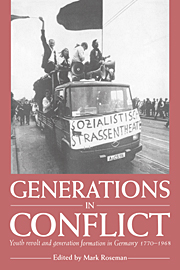Book contents
- Frontmatter
- Contents
- Contributors
- Acknowledgements
- List of abbreviations
- 1 Introduction: generation conflict and German history 1770–1968
- 2 The ideal of youth in late eighteenth-century Germany
- 3 Young Germans and Young Germany: some remarks on the history of German youth in the late eighteenth and in the first half of the nineteenth century
- 4 The battle for the young: mobilising young people in Wilhelmine Germany
- 5 Jewish politics and generational change in Wilhelmine Germany
- 6 The ‘front generation’ and the politics of Weimar Germany
- 7 The New Woman and generation conflict: perceptions of young women's sexual mores in the Weimar Republic
- 8 Generations of German historians: patronage, censorship and the containment of generation conflict 1918–1945
- 9 Gender, generation and politics: young Protestant women in the final years of the Weimar Republic
- 10 The Hitler Youth generation and its role in the two post-war German states
- 11 The BDM generation: a female generation in transition from dictatorship to democracy
- 12 A generation twice betrayed: youth policy in the transition from the Third Reich to the Soviet Zone of Occupation (1945–1946)
- 13 The generation conflict that never was: young labour in the Ruhr mining industry 1945–1957
- 14 The German Kriegskinder: origins and impact of the generation of 1968
- Index
2 - The ideal of youth in late eighteenth-century Germany
Published online by Cambridge University Press: 19 October 2009
- Frontmatter
- Contents
- Contributors
- Acknowledgements
- List of abbreviations
- 1 Introduction: generation conflict and German history 1770–1968
- 2 The ideal of youth in late eighteenth-century Germany
- 3 Young Germans and Young Germany: some remarks on the history of German youth in the late eighteenth and in the first half of the nineteenth century
- 4 The battle for the young: mobilising young people in Wilhelmine Germany
- 5 Jewish politics and generational change in Wilhelmine Germany
- 6 The ‘front generation’ and the politics of Weimar Germany
- 7 The New Woman and generation conflict: perceptions of young women's sexual mores in the Weimar Republic
- 8 Generations of German historians: patronage, censorship and the containment of generation conflict 1918–1945
- 9 Gender, generation and politics: young Protestant women in the final years of the Weimar Republic
- 10 The Hitler Youth generation and its role in the two post-war German states
- 11 The BDM generation: a female generation in transition from dictatorship to democracy
- 12 A generation twice betrayed: youth policy in the transition from the Third Reich to the Soviet Zone of Occupation (1945–1946)
- 13 The generation conflict that never was: young labour in the Ruhr mining industry 1945–1957
- 14 The German Kriegskinder: origins and impact of the generation of 1968
- Index
Summary
At the beginning of the second act of Schiller's Don Carlos, the young prince begs his father Philipp II to entrust him with at least some of the affairs of state. Faced with his father's refusal, on the grounds that he is too young and in experienced, Carlos exclaims ‘Twenty three years old, and I've done nothing to achieve immortality!’ By the standards of the late twentieth century, one might think a young man of 23 who is impatient, even despairing, at the thought that he has done nothing to secure immortality rather unrealistic. Yet in 1787 when the play appeared such a sentiment would not have seemed extraordinary. For the last decades of the eighteenth century saw the explosion of a veritable cult of youth. Schiller himself and a number of others had in fact achieved immortality by the time they reached their early 20s. Of course they were not typical. Yet they gave expression to an ideal of youth which had a significant impact at the time. They also established the basis of a long-term tradition.
Schiller and his contemporaries represented the first dramatic modern manifestation of youth rebellion and conflict between generations. To analyse the preconditions of this phenomenon and to try to define its character is to confront some of the most intractable of all historical problems. For the tension and conflict between generations was rooted in the core of the development of both the modern family and modern society as a whole.
The birth of the modern family presents us with something of a paradox: no sooner was it born than it was faced with dissension and dislocation.
- Type
- Chapter
- Information
- Generations in ConflictYouth Revolt and Generation Formation in Germany 1770–1968, pp. 47 - 68Publisher: Cambridge University PressPrint publication year: 1995
- 1
- Cited by



